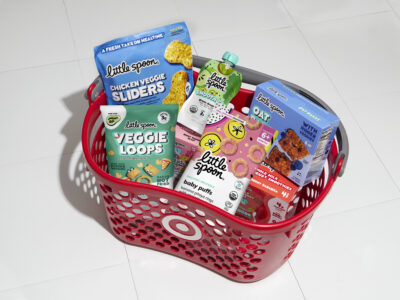Just when you’re getting this whole parenthood routine down, mother nature has to throw us a curveball: time to introduce solids. $h*t! What to do? There’s SO much misinformation out there: fruits or veggies first? Cereal or no cereal? Morning, lunchtime or evening feeding? It’s enough to make a mom flip a table Teresa Giudice-style.
The good thing: you’re reading this article. We rounded up two top pediatricians to tell you exactly how to intro solids to your babe. Dina DiMaggio and Anthony Porto are some of the best in the business and even have an amazing book out The Pediatrician’s Guide to Feeding Babies and Toddlers: Practical Answers To Your Questions on Nutrition, Starting Solids, Allergies, Picky Eating, and More.
When should I start solid foods?
This is often a confusing question for parents since different organizations recommend slightly different starting times. The World Health Organization and the AAP Section on Breastfeeding recommend exclusive breastfeeding until 6 months of age and to then introduce solids at 6 months. The American Academy of Allergy, Asthma, and Immunology, however, recommends starting solids foods between 4-6 months old.
We recommend to talk to your baby’s pediatrician to first determine when your baby is developmentally ready to start solids, whether it be 4, 5, or 6 months.
Anthony started his son, Seb, on solids at around 5 months because he seemed developmentally ready – he had good head control, was able to sit with some support, turned his head when he was done eating, and even tried to grab food from Anthony’s plate!
What is the best food to start with?
There is no best order to give pureed foods and no “it” food to start with, so just have fun with it! By tradition, baby cereals were given first, or it was advised to start vegetables before fruits so a baby won’t only gravitate toward sweet foods, but we find it is more important just to offer a variety of fruits, vegetables, and meats, in any order to get your baby used to different flavors.
If a baby doesn’t like the taste of the food for the first time, or even the 20th time, no worries, sometimes it takes over 20 tries before a baby will like a particular food. Also, try preparing the food in different ways. Dina’s daughter, Evie, would make a frown when she was offered chicken and would spit it right up. Every. Single. Time. Dina learned that her daughter would gobble the chicken up, however, if it was sprinkled with a touch of cinnamon or mixed with a bit of applesauce. If the food isn’t appetizing to you, then your baby probably won’t like the taste either!
Are there any foods I shouldn’t give to my infant?
Honey and foods containing honey (such as honey sweetened cereal or crackers) should not be given until over 12 months of age for the risk of botulism. Also, whole milk should not be given before one year of age. Unpasteurized or undercooked foods, for example, undercooked meat, fish, or eggs, should also not be introduced to infants or young children. Finally, infants under one should not eat foods that contain added salt.
When can I introduce peanut butter or other nut products?
Previously, pediatricians used to tell parents to avoid peanuts until after a child was one year old. Newer research shows, however, that introduction to peanut containing foods may begin at an earlier age, as young as 4 to 6 months, after talking to your pediatrician first. Depending on a baby’s risk for developing a peanut allergy, your pediatrician may recommend blood tests or send you to an allergist for further testing, such as skin prick tests, to determine if and when peanuts can be introduced.
Dina first introduced peanut butter to her daughter, Julia, by mixing a small amount of it in whole Greek yogurt. She absolutely loved it as a baby and now, at six years old, she asks for it as her dessert after dinner instead of a sugary snack.
What should I do if my child becomes constipated?
We know how hard it is to see your baby constipated!
It is common for a baby’s bowel movements to become harder or less frequent after starting solid foods. Try reducing the constipating foods in your baby’s diet, such as bananas, and give more fruits, such as prunes, apricots, and pears. When Anthony’s son first began eating solid foods, he noticed that his son’s stools became harder, more difficult to pass, and he even seemed to be eating less. Anthony added pureed prunes to Seb’s diet and within a day his stools became more regular and Seb returned to his happy self. Approximately one tablespoon of prune puree contains 2 prunes, a natural laxative. Now that Seb is a toddler and starting to potty train, when he goes through bouts of having harder stools, Anthony gives him cut up prunes, prune puree to dip his pancakes in, or pear ice pops as a dessert, to help soften up his stools.
And there you have it! Our top tips and tricks when it comes to introducing solids for the first time. Happy eating!



